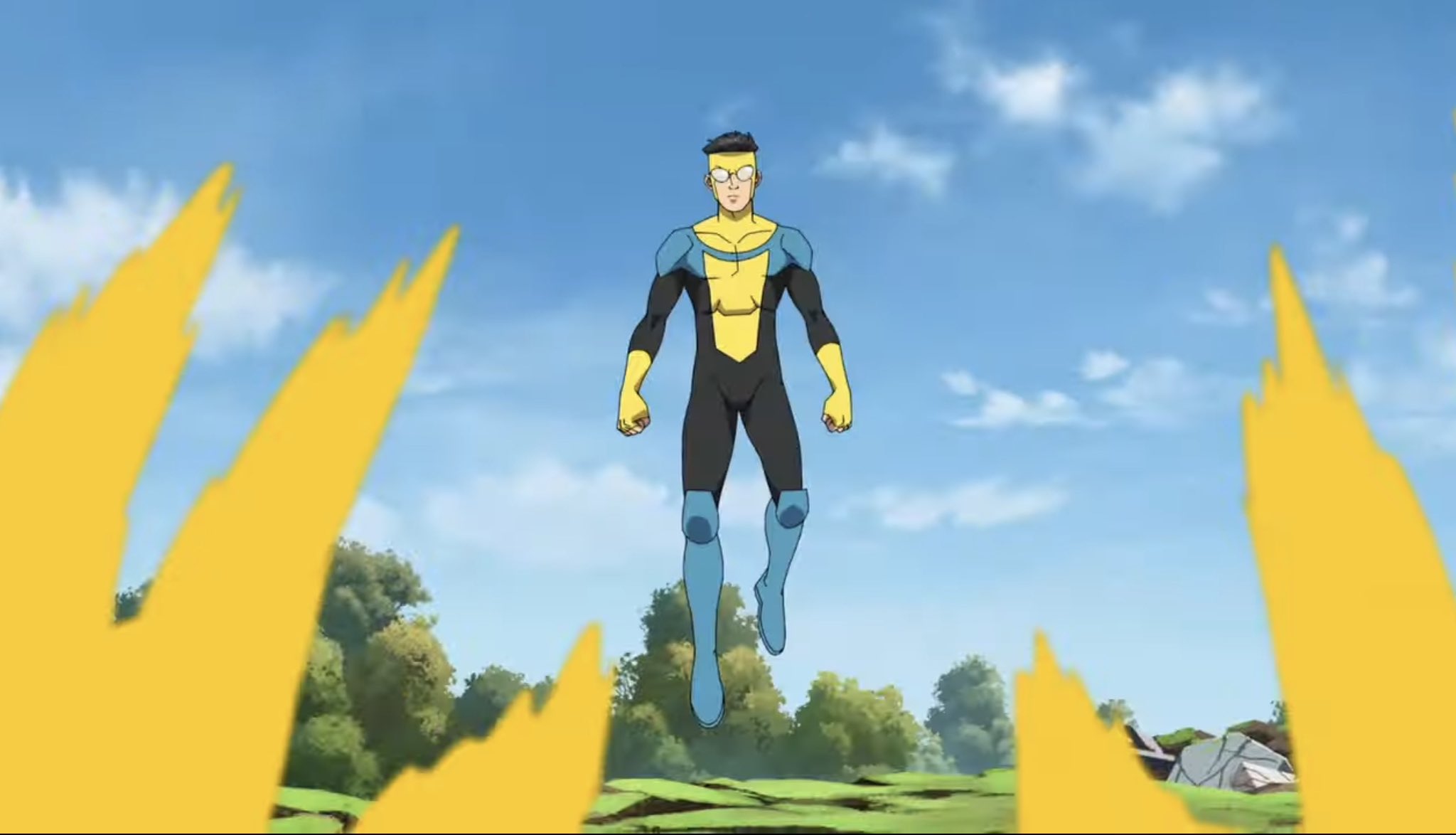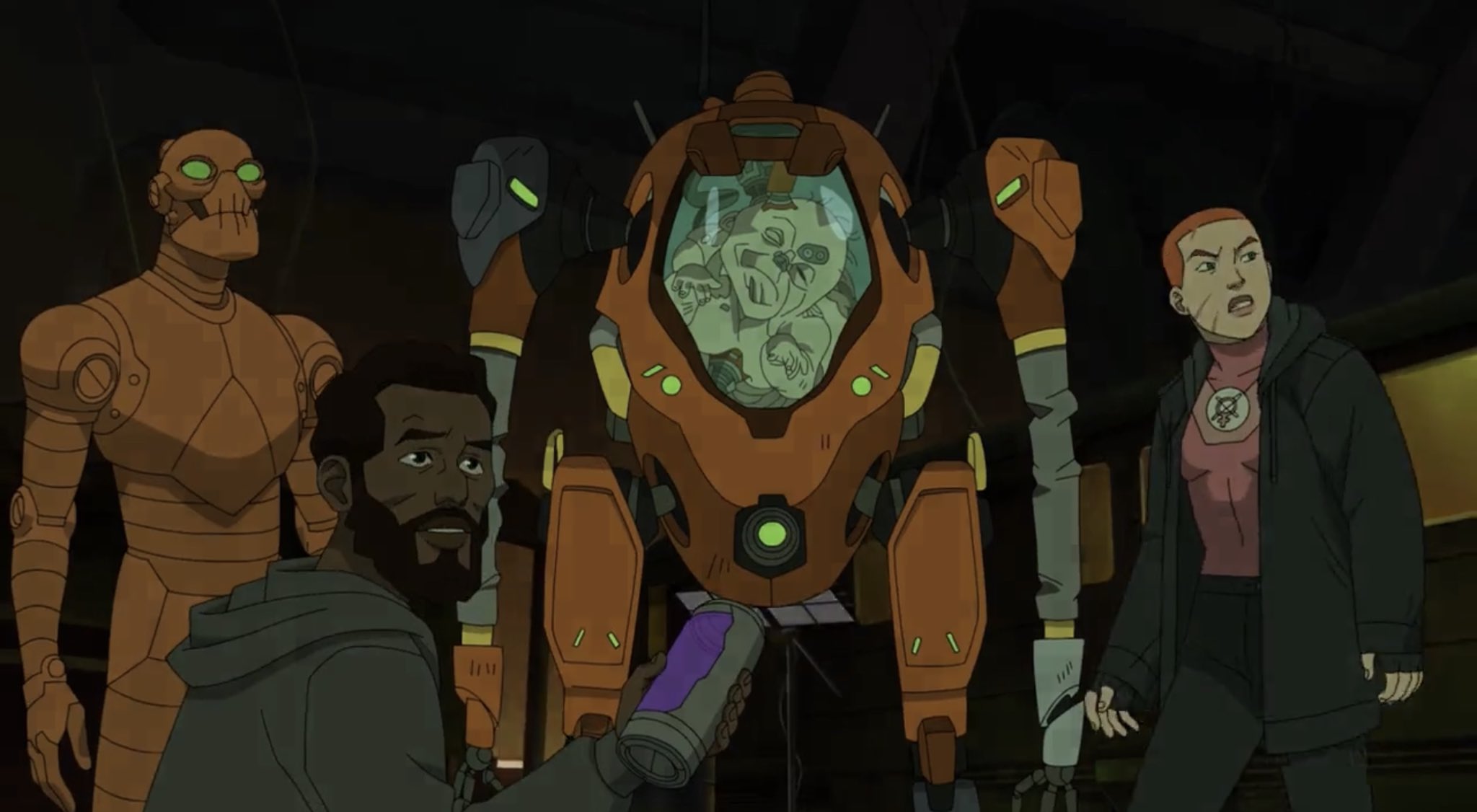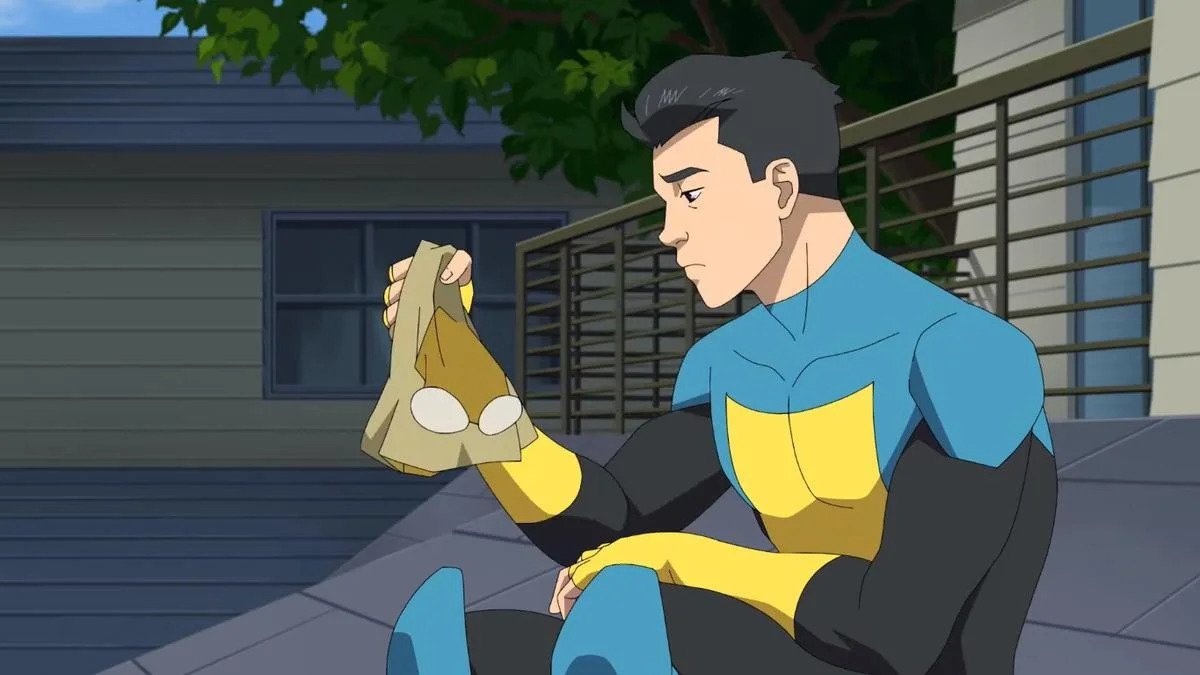This discussion of Invincible season 2 contains slight spoilers.
Invincible is back this week, premiering on Amazon Prime. The show is a glorious and gleeful celebration of comic tropes, but it is also layered with compelling human drama.
In some ways, Invincible is a reminder of just how thoroughly the conventions of superhero storytelling have permeated the mainstream. The show takes place in a world that feels fully formed, in which superheroism is just a fact of life. As such, the series has to do remarkably little handholding to guide the audience through this universe populated by incredibly powerful aliens, clones confused about the nature of their identity, hidden empires of fish people, and societies of lizard supervillains.
Of course, in many cases it’s possible to identify an obvious influence on a given Invincible character or concept. Cecil Stedman (Walton Goggins), the head of the Global Defense Initiative, is clearly evoking characters like Amanda Waller or Nick Fury. The Guardians of the Globe suggest the Justice League or the Avengers. Dimension-hopping supervillain Angstrom Levy (Sterling K. Brown) recalls Kang the Conqueror.
In many cases, these parallels help to orient the viewer within the world of the show. Omni-Man (J.K. Simmons) is recognizable as a Superman stand-in. By that logic, Darkwing (Lennie James) is Batman, War Woman (Lauren Cohan) is Wonder Woman, Red Rush (Michael Cudlitz) is the Flash, Aquarus (Ross Marquand) is Aquaman, and Martian Man (Chad L. Coleman) is the Martian Manhunter. Aquarus’ kingdom is obviously Aquaman’s Atlantis. The Lizard League recalls the Serpent Society.
It is a clever approach to building a superhero world, as it allows Invincible to just throw the audience into an existing framework and have them figure it out as they go along. It’s a refreshing approach in a landscape dominated by superhero movies that are still fixated on origin stories. Even recent superhero movies that aren’t explicitly origin stories, like Spider-Man: No Way Home or The Batman, are often stories about the start of their protagonists’ career.

This approach is understandable. Origin stories are appealing because they provide a clear structure and arc. In a genre defined by “the illusion of change,” it’s reasonable that most superhero multimedia would be drawn to stories about that narrow window in a hero’s career where they can change. It makes for gripping drama. It’s very hard to sell a movie or television show where the character doesn’t change, but instead remains static in the way that comic book superheroes tend to.
However, this comes at a cost. Many of the best Marvel and DC comic book stories could only be told in a universe that has the baggage of decades of continuity on which they might build. These stories tend to take for granted elements that have been set up over years and decades. To pick a straightforward example, A Death in the Family is a story built around the emotional crux of the death of the second character to carry the mantle of Robin, which requires a lot of groundwork.
It is hard to build to those sorts of emotional or dramatic payoffs when stories keep starting over, even in shared continuity. The Marvels film is going to have to introduce both Kamala Khan (Iman Vellani) and Monica Rambeau (Teyonah Parris) for moviegoers who didn’t watch the streaming series Ms. Marvel or WandaVision. Despite the ground covered in The Falcon and the Winter Soldier, Captain America: Brave New World is going to have to reintroduce Sam Wilson (Anthony Mackie) as the new Captain America.
There are exceptions to this general trend. In particular, writer and director James Gunn is very good at capturing this sense of a lived-in superhero world in projects like his Guardians of the Galaxy trilogy or The Suicide Squad. Those are movies that take superhero concepts at face value, rather than trying to over-explain or justify them. The same is true of the recent Spider-Verse movies, which speedrun their origins as a joke. However, these are the exception rather than the rule.
For its part, Invincible uses shorthand to bypass a lot of the nitty-gritty setup. It is built on the assumption that, by this point, the average audience member has been exposed to literally decades of superhero media. They are media literate and know how these stories work. As such, they can jump on board with concepts like the Mauler Twins (Kevin Michael Richardson), a mad scientist who has cloned himself so often that there are always two of him and neither knows which is the original.
On one level, this just frees Invincible to deliver the kind of good old-fashioned superhero fun that other more conventional superhero shared universes like the Marvel Cinematic Universe (the MCU) or the DC Extended Universe (the DCEU) should embrace. The show can just casually introduce vast interstellar empires or cool underwater kingdoms because that’s how the logic of superhero stories should work. The assumption is that the audience knows that this is how these stories work.

It helps that Invincible is animated rather than live action. Even ignoring the budgetary concerns of trying to render this level of spectacle for a weekly live action television show, there is a greater suspension of disbelief in animation than in film. It’s one reason why Disney’s photorealistic remakes of their animated classics wander into the uncanny valley. It also helps that animation is, by its nature, closer to the visual language of comic books than live action film or television.
Of course, this raises the question of why there aren’t more animated superhero films and shows. After all, with shows like Invincible and Harley Quinn or movies like the Spider-Verse franchise, the genre arguably has a more consistent track record in animation than live action. It seems likely that the existing stigma against western animation as a medium aimed at children plays a key role here. Live action adaptations are seen as more prestigious and more respectable.
Invincible is not a show aimed at children. This is true in both form and content. It is graphically violent and explicitly sexual. However, it is also structured as a collection of hour-long episodes, a format that distinguishes it from the tradition of animated superhero shows intended for children like Batman: The Animated Series or X-Men: The Animated Series. The individual episodes of Invincible have runtimes comparable to prestige shows like Better Call Saul or Mad Men.
This is Invincible’s most impressive trick. It lovingly riffs on the conventions and narrative logic of classic Silver and Bronze Age comics, where cities can be randomly cursed to “perpetual midnight, permanent darkness, summer on the dark side of the moon” and where Omni-Man’s son, Mark Grayson (Steven Yeun), can find himself tasked with marrying Aquarus’ widow Aquaria (Tatiana Maslany), but it is also engaged with the inner emotional lives of its characters. Superheroism takes a toll.
Invincible might embrace the inherent ridiculousness of superhero storytelling, but it takes its characters seriously. The show explores what it might be like to live through the bizarro narrative logic that guides stories like these. For example, Omni-Man murdered Cecil’s personal aide, Donald Ferguson (Chris Diamantopoulos), at the end of the first season. However, in the second season, Donald is alive again. Comic book resurrections are business-as-usual, but Donald is clearly unsettled.
Much of the second season is given over to Omni-Man’s wife and Mark’s mother, Debbie (Sandra Oh). Debbie is dealing with the emotional fallout of Omni-Man’s betrayal, his mass murder of both superheroes and civilians, and the realization that after decades of marriage he only loved her “like a pet.” Debbie struggles to process those emotions, eventually ending up at a support group for superhero spouses, populated by characters working through similar issues.

There are plenty of other examples. Mark pushes himself to the limits in an effort to both atone for his father’s sins and prove that he is a completely different person. Atom Eve (Gillian Jacobs) deals with her own father’s (Fred Tatasciore) feelings of inadequacy when confronted with his daughter’s superpowers. When superhero Robot (Zachary Quinto and Ross Marquand) clones a child body for himself so he can be flesh and blood again, he struggles with human emotions like fear.
There is an emotional complexity and nuance here that is missing from so much modern superhero media. In Avengers: Endgame, half of the world’s population just vanished for five years. That should have had profound consequences, leading to something similar to The Leftovers. However, “the Blip” was treated as a joke in Spider-Man: Far From Home and while it has come up as a plot point in some recent productions there has been no real attempt to explore the emotional fallout from it.
Of course, Invincible is far from the first superhero story to try to engage with the emotional reality of these heightened concepts. Comic book writer Grant Morrison has been exploring this idea for decades, through genre-defining works like Animal Man or All-Star Superman. Morrison’s comics are often about characters reacting emotionally to the absurd logic of comic book plotting. However, Invincible feels like the first superhero adaptation to attempt something similar in film or television.
It might sound reasonable to ask why these stories should try to convey recognizable emotional responses to fundamentally absurd plot points. If these stories are about events that could never really happen, perhaps it’s pointless to try to engage with them emotionally. This is a myopic understanding of how stories work. Put simply, characters are easier to engage with and empathize with when they are allowed to express emotion, even in the face of something unreal.
More to the point, these sorts of stories are heightened expressions of recognizable human drama. Most children struggle to escape the shadow of their parents, as Mark does with Omni-Man. Many people have felt betrayed by a loved one, like Debbie does with Omni-Man. Sometimes things happen that people just don’t have a framework to process, as Donald experiences. After all, the past few years have felt somewhat apocalyptic, so it is not as if these stories are entirely unrelatable.
Invincible is titled in reference to Mark’s superhero persona, a reminder that the young man is as physically invulnerable as Silver Age Superman. However, the show’s real trick is understanding that the deepest scars aren’t always physical, and that even a fantastical world of aliens, robots, and fish empires can still be deeply traumatic.





